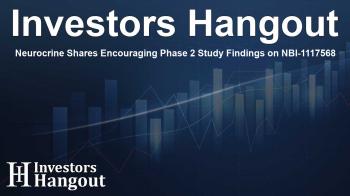Neurocrine Shares Encouraging Phase 2 Study Findings on NBI-1117568

Hopeful Advances in Schizophrenia Treatment from Neurocrine
Neurocrine Biosciences, Inc. (NASDAQ: NBIX) recently presented significant findings from their Phase 2 study of NBI-1117568, an investigational treatment for schizophrenia. This promising research was showcased at a leading annual meeting focused on clinical psychopharmacology. The study results revealed noteworthy improvements in both symptom severity and safety, addressing a critical need for innovative therapies in this challenging disorder.
Understanding the Impact of Schizophrenia
Schizophrenia is a complex and multifaceted condition that affects millions across the globe, contributing heavily to emotional distress and functional limitations. Traditional antipsychotic treatments often leave patients facing substantial short-term and long-term challenges, with many discontinuing therapy as a result. Recognizing these struggles, the demand for viable alternatives is paramount.
NBI-1117568: A Game Changer?
NBI-1117568 stands out as a unique oral treatment focusing on the muscarinic M4 receptor, heralding a new approach in managing schizophrenia symptoms. Eiry W. Roberts, M.D., Chief Medical Officer at Neurocrine, expressed optimism about this direct agonist’s potential to enhance patient outcomes while minimizing side effects. The treatment aims to regulate neurotransmitters associated with schizophrenia, presenting a potential breakthrough in clinical psychiatry.
Study Design and Key Findings
The Phase 2 study comprised adults aged 18 to 55 diagnosed with schizophrenia, randomized to receive varying dosages of NBI-1117568 or a placebo. The comprehensive design involved a six-week double-blind, placebo-controlled phase, followed by a two-week safety follow-up to gather detailed insights on tolerability and efficacy.
Throughout the duration, NBI-1117568 demonstrated a favorable safety profile across all dosage levels. Discontinuation rates due to adverse events remained comparable with those of the placebo group, indicating a reassuring tolerability. However, the most reported side effects included somnolence and dizziness, although these were typically mild and transient.
Significant Results and Future Directions
One of the primary goals of the study was to measure changes in the Positive and Negative Syndrome Scale (PANSS) score by the sixth week. The results exhibited significant reductions in symptom severity for patients on the 20 mg dosage by Week 3, continuing to improve through Week 6. The Clinical Global Impression of Severity (CGI-S) scale echoed these findings, showcasing sustained progress over the study period.
Although higher doses such as 40 mg and 60 mg yielded reductions as well, they did not achieve statistical significance compared to placebo, highlighting the need for further research to optimize treatment doses.
The Path Ahead with Phase 3 Trials
Encouraged by the Phase 2 outcomes, Neurocrine is gearing up for a Phase 3 registration trial, which aims to further assess NBI-1117568’s effectiveness. This upcoming global study will focus on adults facing acute exacerbations of schizophrenia, with an anticipated enrollment of approximately 280 participants. Notably, the trial will maintain the PANSS as the primary endpoint to critically evaluate efficacy.
Additionally, secondary endpoints will include improvements on the CGI-S scale, painting a comprehensive picture of NBI-1117568's potential to improve patient quality of life.
Broader Research Context at the Meeting
In conjunction with NBI-1117568, additional research presentations unveiled significant findings in related areas, including important studies on tardive dyskinesia treatment—another critical concern in mental health pharmacotherapy. Neurocrine's ongoing commitment to advancing treatment for complex psychiatric conditions was evident throughout the presentations.
Understanding Neurocrine Biosciences' Mission
Neurocrine Biosciences is devoted to developing effective therapies for various neurological and neuropsychiatric conditions. Their portfolio includes innovative treatments for tardive dyskinesia, Huntington's disease, and more, continuously optimizing therapeutic approaches based on evolving research. As they move forward with NBI-1117568, their aim remains clear: to improve the lives of those affected by debilitating disorders through brave scientific innovation.
Frequently Asked Questions
What is NBI-1117568?
NBI-1117568 is an investigational oral therapy targeting muscarinic M4 receptors, developed by Neurocrine Biosciences for the treatment of schizophrenia.
What were the main findings of the Phase 2 study?
The Phase 2 study indicated significant improvements in symptom severity and demonstrated a favorable safety profile for NBI-1117568 compared to placebo.
What is the next step for Neurocrine following these results?
Neurocrine plans to initiate a Phase 3 registration trial to further evaluate the efficacy and safety of NBI-1117568 in treating schizophrenia.
How many participants will be involved in the Phase 3 trial?
Approximately 280 participants will be enrolled in the upcoming Phase 3 trial.
What are the broader implications of this research?
The research aims to expand treatment options for schizophrenia, addressing unmet medical needs, and improving patient quality of life through innovative therapies.
About The Author
Contact Henry Turner privately here. Or send an email with ATTN: Henry Turner as the subject to contact@investorshangout.com.
About Investors Hangout
Investors Hangout is a leading online stock forum for financial discussion and learning, offering a wide range of free tools and resources. It draws in traders of all levels, who exchange market knowledge, investigate trading tactics, and keep an eye on industry developments in real time. Featuring financial articles, stock message boards, quotes, charts, company profiles, and live news updates. Through cooperative learning and a wealth of informational resources, it helps users from novices creating their first portfolios to experts honing their techniques. Join Investors Hangout today: https://investorshangout.com/
The content of this article is based on factual, publicly available information and does not represent legal, financial, or investment advice. Investors Hangout does not offer financial advice, and the author is not a licensed financial advisor. Consult a qualified advisor before making any financial or investment decisions based on this article. This article should not be considered advice to purchase, sell, or hold any securities or other investments. If any of the material provided here is inaccurate, please contact us for corrections.

